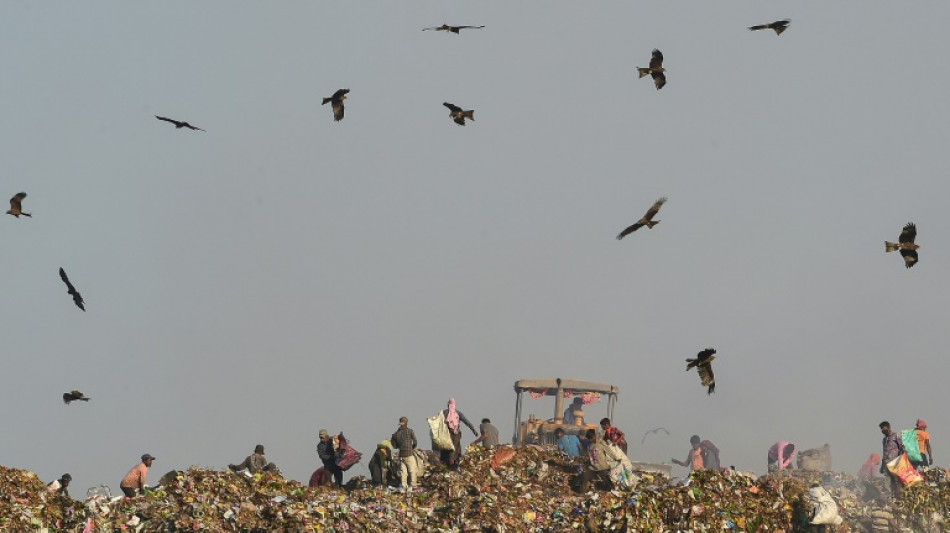
-
 EU universal charger rules come into force
EU universal charger rules come into force
-
Evenepoel targets return in time for Ardennes classics

-
 Duffy bowls New Zealand to T20 victory over Sri Lanka
Duffy bowls New Zealand to T20 victory over Sri Lanka
-
Turkey's pro-Kurd party to meet jailed PKK leader on Saturday

-
 Gaza hospital shut after Israeli raid, director held: health officials
Gaza hospital shut after Israeli raid, director held: health officials
-
Surgery for French skier Sarrazin 'went well': federation

-
 Mitchell, Bracewell boost New Zealand in Sri Lanka T20
Mitchell, Bracewell boost New Zealand in Sri Lanka T20
-
Kyrgios says tennis integrity 'awful' after doping scandals

-
 S. Korean prosecutors say Yoon authorised 'shooting' during martial law bid
S. Korean prosecutors say Yoon authorised 'shooting' during martial law bid
-
Vendee Globe skipper Pip Hare limps into Melbourne after dismasting

-
 Reddy's defiant maiden ton claws India back into 4th Australia Test
Reddy's defiant maiden ton claws India back into 4th Australia Test
-
Doubles partner Thompson calls Purcell doping case 'a joke'

-
 Reddy reaches fighting maiden century for India against Australia
Reddy reaches fighting maiden century for India against Australia
-
Sabalenka enjoying 'chilled' rivalry with Swiatek

-
 Political turmoil shakes South Korea's economy
Political turmoil shakes South Korea's economy
-
New mum Bencic wins first tour-level match since 2023 US Open

-
 'Romeo and Juliet' star Olivia Hussey dies aged 73
'Romeo and Juliet' star Olivia Hussey dies aged 73
-
Brown dominates as NBA champion Celtics snap skid

-
 Indian state funeral for former PM Manmohan Singh
Indian state funeral for former PM Manmohan Singh
-
France asks Indonesia to transfer national on death row

-
 Ambitious Ruud targets return to top five in 2025
Ambitious Ruud targets return to top five in 2025
-
Late bloomer Paolini looking to build on 'amazing' 2024

-
 Australia remove Pant, Jadeja as India reach 244-7 at lunch
Australia remove Pant, Jadeja as India reach 244-7 at lunch
-
Scheffler sidelined by Christmas cooking injury

-
 Rice seeks trophies as Arsenal chase down 'full throttle' Liverpool
Rice seeks trophies as Arsenal chase down 'full throttle' Liverpool
-
Trump asks US Supreme Court to pause law threatening TikTok ban

-
 Arsenal edge past Ipswich to go second in Premier League
Arsenal edge past Ipswich to go second in Premier League
-
LawConnect wins punishing and deadly Sydney-Hobart yacht race

-
 Ronaldo slams 'unfair' Ballon d'Or result after Vinicius snub
Ronaldo slams 'unfair' Ballon d'Or result after Vinicius snub
-
Several wounded N.Korean soldiers died after being captured by Ukraine: Zelensky

-
 Fresh strike hits Yemen's rebel-held capital
Fresh strike hits Yemen's rebel-held capital
-
Netflix with Beyonce make splash despite NFL ratings fall

-
 Bird flu mutated inside US patient, raising concern
Bird flu mutated inside US patient, raising concern
-
Slovakia says ready to host Russia-Ukraine peace talks

-
 Maresca challenges Chelsea to react to Fulham blow
Maresca challenges Chelsea to react to Fulham blow
-
Tech slump slays Santa rally, weak yen lifts Japan stocks higher

-
 Test records for Zimbabwe and Williams as Afghanistan toil
Test records for Zimbabwe and Williams as Afghanistan toil
-
LawConnect wins punishing Sydney-Hobart yacht race

-
 Barca's Yamal vows to 'come back better' after ankle injury
Barca's Yamal vows to 'come back better' after ankle injury
-
Olmo closer to Barcelona exit after registration request rejected

-
 Watching the sun rise over a new Damascus
Watching the sun rise over a new Damascus
-
Malaysia man flogged in mosque for crime of gender mixing

-
 Montenegro to extradite crypto entrepreneur Do Kwon to US
Montenegro to extradite crypto entrepreneur Do Kwon to US
-
Brazil views labor violations at BYD site as human 'trafficking'

-
 No extra pressure for Slot as Premier League leaders Liverpool pull clear
No extra pressure for Slot as Premier League leaders Liverpool pull clear
-
Tourists return to post-Olympic Paris for holiday magic

-
 'Football harder than Prime Minister' comment was joke, says Postecoglou
'Football harder than Prime Minister' comment was joke, says Postecoglou
-
Driver who killed 35 in China car ramming sentenced to death

-
 Bosch gives South Africa 90-run lead against Pakistan
Bosch gives South Africa 90-run lead against Pakistan
-
French skier Sarrazin 'conscious' after training crash

| RBGPF | 100% | 59.84 | $ | |
| BCC | -1.91% | 120.63 | $ | |
| SCS | 0.58% | 11.97 | $ | |
| BCE | -0.93% | 22.66 | $ | |
| RIO | -0.41% | 59.01 | $ | |
| CMSD | -0.67% | 23.32 | $ | |
| CMSC | -0.85% | 23.46 | $ | |
| NGG | 0.66% | 59.31 | $ | |
| GSK | -0.12% | 34.08 | $ | |
| RELX | -0.61% | 45.58 | $ | |
| JRI | -0.41% | 12.15 | $ | |
| BP | 0.38% | 28.96 | $ | |
| VOD | 0.12% | 8.43 | $ | |
| RYCEF | 0.14% | 7.27 | $ | |
| AZN | -0.39% | 66.26 | $ | |
| BTI | -0.33% | 36.31 | $ |

World must act to stem surge of polluting trash, UN warns
The world generated 2.3 billion tonnes of municipal waste last year and the pile of trash is set to grow another two-thirds by 2050, the UN said Wednesday, warning of devastating costs for health, economies and the environment.
Pollution is set to escalate, according to new research by the UN Environment Programme (UNEP), with projections suggesting the greatest growth in rubbish will be in regions that currently rely on open dumping and burning -- practices that emit greenhouse gases, and leach toxic chemicals into soils, waterways and the air.
Without urgent action, the waste mountain is expected to grow to 3.8 billion tonnes by the middle of the century, according to the estimate, which exceeds previous forecasts.
It also suggests the economic burden will almost double when the "hidden costs" linked to poor waste disposal from pollution, poor health and climate change are taken into account, reaching some $640 billion a year by 2050, from around $361 billion in 2020.
"Waste generation is intrinsically tied to GDP, and many fast-growing economies are struggling under the burden of rapid waste growth," said Inger Andersen, UNEP's Executive Director.
She said the report could help governments in their efforts to "create more sustainable societies and to secure a liveable planet for future generations".
The report by UNEP and the International Solid Waste Association (ISWA) was launched at the UN's Environment Assembly being held this week in Nairobi.
It is both a "guide and call for action" to come up with solutions, ISWA said.
Those solutions include preventing the rubbish being generated in the first place, as well as better disposal and treatment methods, which could limit net annual costs by 2050 to around $270 billion, the report found.
But it is possible to do even better, moving to a more circular economic model where increased prosperity is not automatically linked to increased waste.
This could involve sustainable business practices and more complete management of trash, which could see a net gain of more than $100 billion a year, the report said.
"The findings of this report demonstrate that the world urgently needs to shift to a zero waste approach, while improving waste management to prevent significant pollution, greenhouse gas emissions and negative impacts to human health," said the report's lead author Zoe Lenkiewicz, of UNEP.
L.Torres--PC




